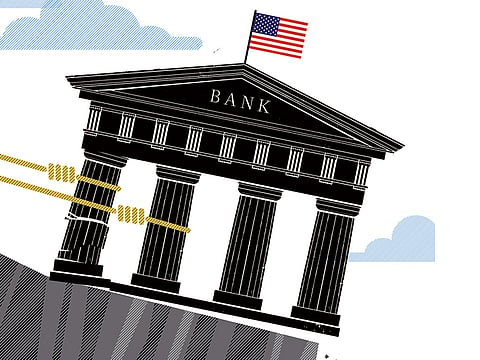Mnuchin urges IMF to correct trade imbalances
His comments lay bare the differences between the Trump administration and the IMF

Washington — US Treasury Secretary Steven Mnuchin urged the International Monetary Fund to do more to help address the world’s economic imbalances, as a fund official suggested the Trump administration is going about the task the wrong way.
Global trade imbalances are roughly a third larger than they were in the 1980s and 1990s, and show no signs of narrowing, Mnuchin said Friday in his statement to the IMF’s steering committee. Countries with “persistent external surpluses” need to do their share to rebalance trade, while the IMF should be more vocal, he said.
“The IMF must step up to the plate on this issue, providing a more robust voice and consistently noting when members maintain macroeconomic, foreign exchange, and trade policies that facilitate unfair competitive advantage or lead to unbalanced growth,” he said.
Mnuchin encouraged the fund to stay within the bounds of its “core mandate” of promoting advances in employment, income and productivity through monetary stability and open trade.
“The IMF does not drive growth; rather, robust private sector activity, resilient financial systems, and worker dynamism fuel economic expansion and wealth generation,” he said in unusually pointed remarks for a Treasury secretary of the US, the IMF’s biggest shareholder.
Trade conflict
Mnuchin’s comments lay bare the differences between the Trump administration and the IMF at a time when policymakers are trying to stave off a trade war between the US and China. America and the UK played leading roles in creating the fund during the Second World War to oversee the global monetary system and steer countries away from the beggar-thy-neighbour policies that took root during the Great Depression.
David Lipton, the IMF’s first deputy managing director, suggested earlier Friday that the Trump administration needs to stop picking one-on-one fights to try to level the playing field.
“We need to pivot from where we are,” Lipton, a former Treasury Department official in the Clinton administration, said in an interview on Bloomberg Television. “The US needs to be letting go of unilateral pressures to achieve its goals.”
President Donald Trump has made it a priority to cut America’s $568 billion trade deficit. But IMF chief economist Maurice Obstfeld on Tuesday said that US measures aimed at narrowing the gap, such as tariffs on metal, will be outweighed by looser fiscal policies that are set to widen it.
Mnuchin said countries should “carefully consider the necessary level of IMF resources and operations,” adding that he believes the fund has enough resources to “meet post-crisis demands.”



